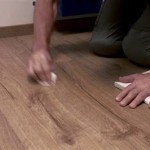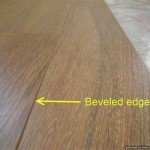Putting Vinyl Flooring Over Ceramic Tile: A Comprehensive Guide
Transforming the look of your flooring can be a daunting task, especially if you're considering installing vinyl flooring over existing ceramic tiles. However, with proper preparation and the right techniques, this project can be surprisingly straightforward. Here's a comprehensive guide to help you navigate the process seamlessly:
1. Assess the Tile Surface
Before you begin, assess the condition of the ceramic tiles. Make sure they are firmly adhered to the subfloor with no loose or cracked tiles. Ensure the surface is smooth and free of any protrusions or uneven areas that may create imperfections in the vinyl flooring.
2. Clean and Prepare the Tiles
Thoroughly clean the ceramic tiles using a degreasing cleaner to remove any dirt, grime, or wax residue. Allow the tiles to dry completely before proceeding. Next, use a sander or scraper to remove any surface imperfections or raised edges, creating a level surface for the vinyl flooring.
3. Use a Primer
Apply a high-quality primer to the ceramic tiles. This step helps to improve adhesion between the vinyl flooring and the ceramic surface. Follow the manufacturer's instructions for application and drying times.
4. Choose the Right Vinyl Flooring
Select vinyl flooring specifically designed for installation over existing hard surfaces. Look for products with a peel-and-stick backing or interlocking planks that can be easily installed without adhesives.
5. Install the Vinyl Flooring
Start installing the vinyl flooring in a corner of the room and work your way out. Carefully remove the backing of the vinyl tiles or planks and firmly press them onto the prepared ceramic surface. Ensure each piece is securely in place and properly aligned. For interlocking vinyl flooring, follow the manufacturer's instructions for connecting the planks.
6. Cut and Fit the Flooring
Use a utility knife or a flooring cutter to trim the vinyl flooring around the edges of the room, doorways, and any obstacles. Measure and cut the pieces precisely to ensure a snug fit. You may need to use a transition strip or molding to fill any gaps between the vinyl flooring and walls or other surfaces.
7. Seal the Installation
After the vinyl flooring is installed, apply a sealant around the edges of the room and any areas where moisture may penetrate. This helps to prevent the vinyl flooring from lifting or buckling due to moisture buildup.
By following these steps carefully, you can successfully install vinyl flooring over ceramic tiles, creating a new and stylish floor without the hassle and expense of removing the existing tiles.

New Vinyl Plank Flooring Over Tile Table And Hearth

New Vinyl Plank Flooring Over Tile Table And Hearth

New Vinyl Plank Flooring Over Tile Table And Hearth

Can You Put Vinyl Plank Flooring Over Ceramic Tile Floors Blvd

Should You Install Vinyl Floor Over Tile

New Vinyl Plank Flooring Over Tile Table And Hearth

What Type Of Flooring Can You Install Over Ceramic Tile

New Vinyl Plank Flooring Over Tile Table And Hearth

How To Lay Tile Over An Existing Vinyl Floor Today S Homeowner

How To Lay Vinyl Flooring Sheet Over Tiles
Related Posts








